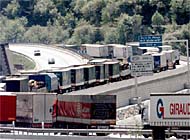Switzerland gears up for new onslaught of heavy goods traffic

Switzerland is preparing for a wave of heavy goods vehicles on its roads. From January, restrictions on weight limits are to be eased and a special tax is being introduced. Truckers are dreading long tailbacks at the main border posts.
Starting in January, the weight limit for heavy goods vehicles is being increased from 28 to 34 tonnes. More 40 tonne trucks will also appear on Swiss roads as part of a transport agreement with the European Union.
At the same time, Switzerland is introducing the world’s first tax on heavy goods vehicles, based on the polluter-pays-principle.
Swiss trucks must be equipped with an electronic on board unit, which registers the distance driven. Foreign trucks can also install the system or pay with a plastic chip card.
The data is administered by the customs authorities as trucks enter or leave Switzerland. The expected revenue of SFr750 million ($460 million) annually will mainly be used for upgrading the Swiss railway network.
The new tax has received a mixed response in Switzerland. The Swiss Road Transport Association says it will lead to long tailbacks at border posts because each truck will need to be checked.
Beat Keiser from the Road Haulage Association told swissinfo that many truckers are being made scapegoats for pollution. Keiser also warns of higher transport prices, which he said will ultimately have to be paid by consumers.
But the environmental organisation, Alpine Initiative, has welcomed the new levy. “We consider the tax a fair deal. It will pay for the damage to the environment and the effects on people,” says spokesman, Jan Gürke.
Gürke says his group will also be monitoring the government’s progress in fulfilling its pledge to move freight traffic from road to rail.
Environmental activists in canton Uri, on the main north-south route through Switzerland, have warned of further protests, including blockades, if the government fails to reduce road traffic in the next few years.
by Urs Geiser

In compliance with the JTI standards
More: SWI swissinfo.ch certified by the Journalism Trust Initiative

You can find an overview of ongoing debates with our journalists here. Please join us!
If you want to start a conversation about a topic raised in this article or want to report factual errors, email us at english@swissinfo.ch.